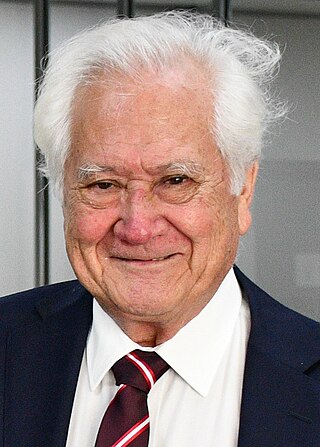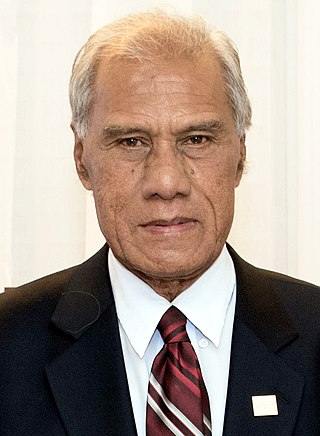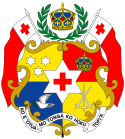Politics in the Philippines are governed by a three-branch system of government. The country is a democracy, with a president who is directly elected by the people and serves as both the head of state and the head of government. The president serves as the leader of the executive branch and is a powerful political figure. A president may only hold office for one six-year term. The bicameral Congress consists of two separate bodies: the Senate, with members elected at-large across the country, and the larger House of Representatives, with members chosen mostly from specific geographic districts. The Congress performs legislative functions. The judiciary is overseen by the Supreme Court of the Philippines and has extensive review jurisdiction over judgments issued by other governmental and administrative institutions.

The history of Tonga is recorded since the ninth century BC, when seafarers associated with the Lapita diaspora first settled the islands which now make up the Kingdom of Tonga. Along with Fiji and Samoa, the area served as a gateway into the rest of the Pacific region known as Polynesia. Ancient Tongan mythologies recorded by early European explorers report the islands of 'Ata and Tongatapu as the first islands having been hauled to the surface from the deep ocean by Maui.

Feleti Vakaʻuta Sevele, Lord Sevele of Vailahi is a Tongan politician who served as the prime minister of Tonga from 30 March 2006 to 22 December 2010.

The Legislative Assembly of Tonga is the unicameral legislature of Tonga.

The People's Republic of Benin was a socialist state located in the Gulf of Guinea on the African continent, which became present-day Benin in 1990. The People's Republic was established on 30 November 1975, after the 1972 coup d'état in the Republic of Dahomey. It effectively lasted until 1 March 1990, with the adoption of a new constitution, and the abolition of Marxism–Leninism in the nation in 1989.

General elections were held in Tonga on 23 and 24 April 2008 to elect members of the Legislative Assembly. The nobles were elected on 23 April, and the nine people's representatives on 24 April. A total of 32,000 people turned out to vote, giving a turnout of 48%.

Samiuela ʻAkilisi Pōhiva was a Tongan pro-democracy activist and politician. A key leader of the Democratic Party of the Friendly Islands (DPFI), he served as the Prime Minister of Tonga from 2014 to his death in 2019. He was only the fourth commoner to serve as Prime Minister, and the first commoner to be elected to that position by Parliament rather than appointed by the King.

Early general elections under a new electoral law were held in Tonga on 25 November 2010. They determined the composition of the 2010 Tongan Legislative Assembly.

The Cabinet of Tonga is the cabinet of the government of the Kingdom of Tonga. It is composed primarily of the ministers of government. The latter, including the Prime Minister, are appointed by the monarch. The Governor of Ha'apai and the Governor of Vava'u also serve on the Cabinet ex officio. When in session and presided over by the monarch, the Cabinet is known as the Privy Council.

General elections were held in Tonga on 3 and 4 February 1993 to elect members of the Legislative Assembly of Tonga. Nine nobles and nine people's representatives were elected. Six of the latter favoured democratic reform. Voter turnout was 59.3%.

General elections were held in Tonga on 18 and 19 February 1987 to elect members of the Legislative Assembly of Tonga. Nine nobles and nine people's representatives were elected. Five of the latter favoured democratic reform.

Samiu Kuita Vaipulu is a Tongan politician and Cabinet Minister. He was the Deputy Prime Minister from 2010 to 2014 and is currently Minister for Trade and Economic Development. He most recently served as the Acting Prime Minister of Tonga from December 2024 to January 2025.

Siale ʻAtaongo Kaho, Lord Tuʻivakanō is a Tongan politician who served as the prime minister of Tonga from 2010 to 2014.

General elections were held in Tonga on 7 May 1984. Nine nobles were elected to the Legislative Assembly by their peers, whilst a further nine People's Representatives were publicly elected. All candidates were independents.
Niuas is an electoral constituency which sends one representative to the Legislative Assembly of Tonga. It covers the islands of Niuafoʻou and Niuatoputapu.
Vavaʻu is an electoral constituency which sends two representatives to the Legislative Assembly of Tonga. It covers the eponymous region and island chain.

General elections were held in Tonga on 27 November 2014. All twenty-six elected seats in the single-chamber Legislative Assembly were up for election, although the monarch, acting on the advice of his Prime Minister, retains the possibility to appoint members to Cabinet from outside Parliament, thus granting them a non-elected ex officio seat in Parliament.

General elections were held in Tonga on 16 November 2017 to elect 17 of the 26 seats to the Legislative Assembly. King Tupou VI dissolved the Assembly on 25 August 2017 on the advice of its Speaker, Sialeʻataongo Tuʻivakanō, who claimed that Prime Minister ʻAkilisi Pohiva was attempting to claim powers held by the King and Privy Council within Cabinet.

Sitenimoa Valevale, styled Lord Nuku, is a Tongan noble, politician, and Cabinet Minister. He represents the ʻEua noble constituency in the Legislative Assembly.
Siaosi ‘Alokuo’ulu Wycliffe Fusitu’a, styled Lord Fusitu’a was a Tongan politician and noble. He was Speaker of the Legislative Assembly of Tonga from 1990 to 1998.












